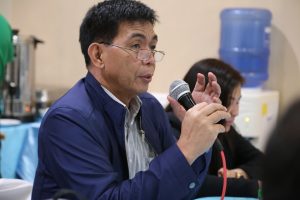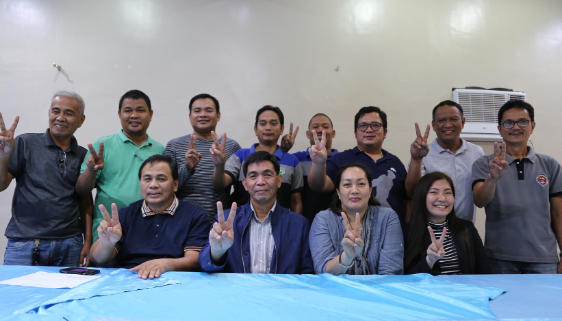
The series of year-end assessment and planning sessions being carried out across the country is led by the Office of the Presidential Adviser on the Peace Process (OPAPP) Director Andres S. Aguinaldo, Jr., the national program manager of PAMANA.
During the activity, Aguinaldo expressed his gratitude to representatives of municipal local government units for fully supporting the implementation of PAMANA projects in their areas.
“OPAPP will endeavor to continue the PAMANA, a program which has been a dynamic element in improving access of communities to greater socio-economic interventions being delivered by our government,” he said.
Impact-driven projects in Bangsamoro communities
Engr. Ingao A. Peno, waterworks superintendent of the municipality of Parang, reported during the meeting that the Level III PAMANA water system built in their municipality has largely benefitted Iranun communities, especially those situated in Moro Islamic Liberation Front (MILF) and Moro National Liberation Front (MNLF) areas.
“The water system really has a huge impact in our municipality, considering that Parang is a melting pot of different Iranun areas, including MILF and MNLF communities,” Peno explained.
“Prior to having our own water system, the people used to pay as much as 50 pesos per water drum. Today, their water expenses was cut down to only 12 pesos per drum,” he added.
According to the Parang municipal government’s report, 356 households are already being serviced by the water system, providing residents with clean, potable water.
It is also worth noting that water services in the area have remained uninterrupted despite the ongoing power outage in the area due to the diesel-powered generators sets included in the project.
It can be recalled that Iranun communities were among the most affected during the all-out-war which broke out in Mindanao almost two decades ago.
Today, various infrastructure projects such as roads, water systems and housing units have been built in the area, resulting in the more efficient movement of goods and services, and the improvement of socio-economic conditions in beneficiary communities.
The PAMANA year-end assessment and planning will cover the areas of Regions IV-B, V, VII, VIII, IX, X, XI, XII, XIII, Cordillera Administrative Region (CAR), and the Bangsamoro Autonomous Region in Muslim Mindanao (BARMM).
At the closing of the assessment and planning sessions, each of the partner MLGUs signed a ways forward agreement to ensure the more efficient implementation of PAMANA projects in their respective areas.
Assistance for more PAMANA communities in 2020
To enable communities to catch up for the years lost during the years of conflict, a national government’s convergence program that extends development interventions to isolated, hard-to-reach and conflict-affected communities is needed. This is to ensure that no one is left behind in the process of development.
A complementary track to peace negotiations, PAMANA is anchored on the principle of winning the peace by forging strategic partnerships with national agencies in promoting a more convergent delivery of goods and services, and addressing regional development challenges in conflict-affected and vulnerable areas (CAAs/CVAs).
The design and delivery of PAMANA is conflict-sensitive and peace-promoting (CSPP) to avoid the recurrence of violence, especially in conflict-ridden communities situated in the Bangsamoro region which became the site of more than forty years of armed struggle, and other CAAs/CVAs throughout the country.
For 2019, a total of Php 386,862,000 worth of PAMANA projects were carried out in partnership with the Department of Social Welfare and Development (DSWD) for the implementation of Community Driven Development Program for Indigenous Peoples (IP-CDD); with the National Commission on Indigenous Peoples on educational assistance for members of the Indigenous People communities; and with the Philippine Health Insurance Corporation for the provision of health insurance.
Recognizing the need to provide assistance to more remote, underdeveloped communities across the country, particularly in conflict affected and vulnerable areas, OPAPP proposed to Congress a PhP3.8B PAMANA budget for fiscal year 2020.
Presidential Peace Adviser Carlito G. Galvez, Jr., is optimistic the proposed PAMANA budget will be approved, as these will help bring sustainable economic growth and long-lasting peace in target communities.
“These (PAMANA) project will help us sustain holistic development in hard-to-reach areas. Projects such as farm-to-market roads, water supply systems, livelihood programs, and environmental protection initiatives are designed to be impact-driven and will hugely contribute to boosting socio-economic development in conflict affected, vulnerable areas, and last-mile communities,” Galvez said.
“We are really grateful to both Houses of Congress for the support they have given to PAMANA over the years. We hope to reach more communities and implement more peace promoting and conflict sensitive projects once our proposed PAMANA 2020 budget is approved,” he added.
PAMANA-assisted communities are located in the Cordillera Administrative Region, Bicol-Quezon-Mindoro, Negros and Panay, Davao-Compostella Valley-Caraga zones, Central Mindanao, and ZamBaSulTa (Zamboanga, Basilan, Sulu, and Tawi-tawi.(PR-OPAPP)

